News Updates
-
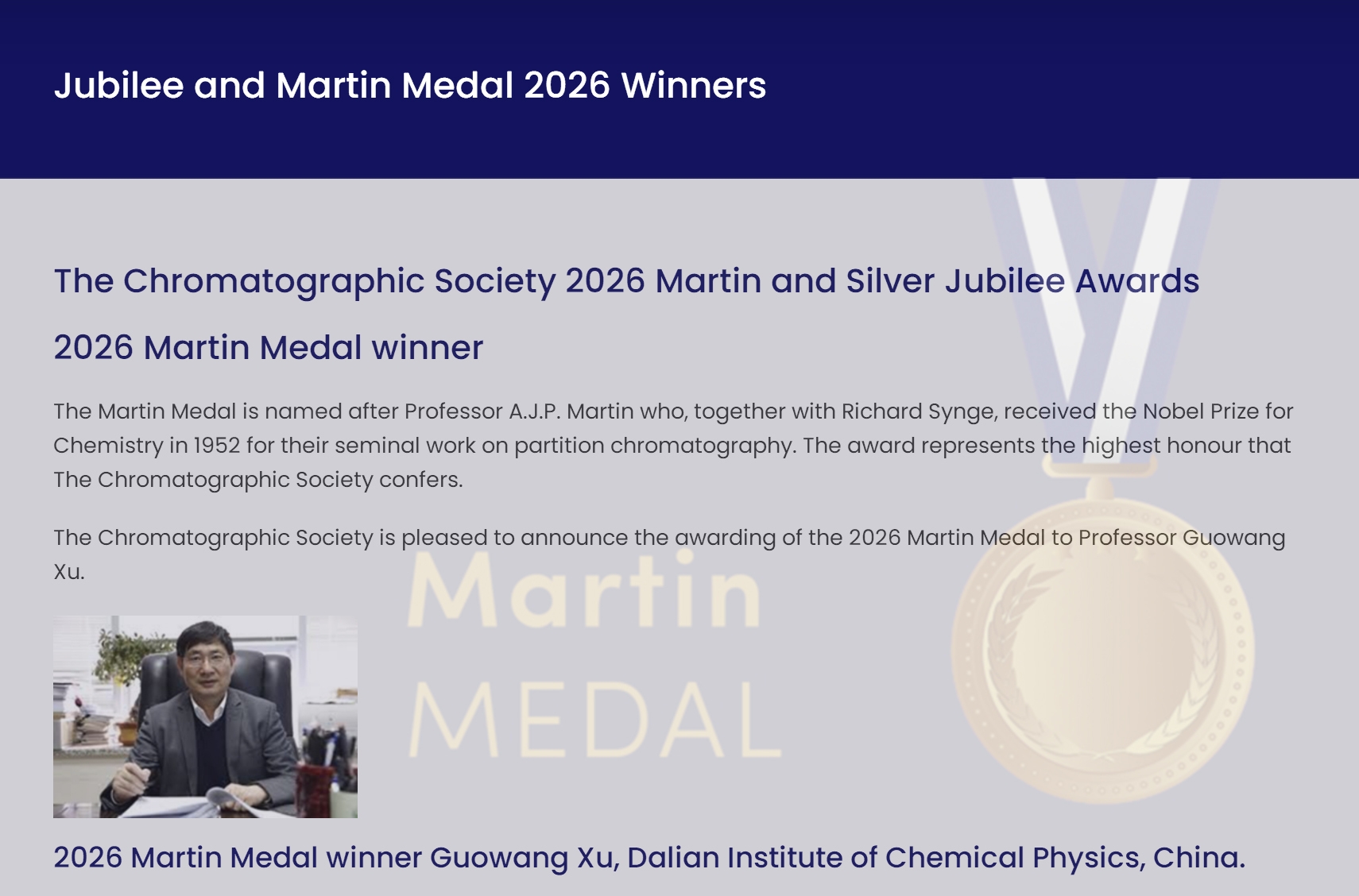 01 20, 2026Prof. XU Guowang Receives 2026 Martin Medal from The Chromatographic SocietyRecently, The Chromatographic Society announced that Prof. XU Guowang from the Dalian Institute of Chemical Physics (DICP) of the Chinese Academy of Sciences (CAS), has been awarded the 2026 Martin Medal, becoming the first Chinese scientist to receive this award.Recently, The Chromatographic Society announced that Prof. XU Guowang from the Dalian Institute of Chemical Physics (DICP) of the Chinese Academy of Sciences (CAS), has been awarded the 2026 Martin Medal, becoming the first Chinese scientist to receive this award.The Martin Medal was established in 1978 and named after UK chemist Archer Martin. Martin, together with Richard Synge, received the 1952 Nobel Prize in Chemistry for their pioneering work on partition chromatography. The Martin Medal is awarded to scientists who have made outstanding contributions to the advancement of separation science.Daniel Meston, the Chair of the Society's Awards Committee, said "after a lengthy nomination and evaluation process, I am very pleased to offer you the 2026 Martin Medal for your enormous contributions to chromatographic and -omics research."Prof. XU has long focused on chromatography and metabolomics research, particularly on liquid chromatography–mass spectrometry (LC–MS) techniques and their applications in complex systems. He has led his team in method development, analytical platform construction, and applied research, establishing metabolomics and lipidomics platforms widely used in the field. He also developed pseudo-targeted metabolomics and modified metabolomics approaches, providing technical support for studies on metabolic reprogramming, biomarker discovery, and food safety analysis.Prof. XU has published several hundred scientific papers and holds over a hundred authorized patents. He previously received the 2020 CAIA Science and Technology Award (Special Prize) and the 2025 CAIA Analytical Science Award (First Prize).Prof. XU has actively promoted the internationalization of Chinese chromatography research. He has presented his work at multiple High-Performance Liquid Chromatography (HPLC) and International Symposium on Chromatography (ISC) meetings and served as a permanent scientific committee member of the HPLC from 2008 to 2024. He has also served as editor or editorial board member for journals including Journal of Chromatography B, Analytical Chemistry, and TrAC- Trends in Analytical Chemistry, contributing to academic exchange and collaboration between domestic and international chromatography communities.
01 20, 2026Prof. XU Guowang Receives 2026 Martin Medal from The Chromatographic SocietyRecently, The Chromatographic Society announced that Prof. XU Guowang from the Dalian Institute of Chemical Physics (DICP) of the Chinese Academy of Sciences (CAS), has been awarded the 2026 Martin Medal, becoming the first Chinese scientist to receive this award.Recently, The Chromatographic Society announced that Prof. XU Guowang from the Dalian Institute of Chemical Physics (DICP) of the Chinese Academy of Sciences (CAS), has been awarded the 2026 Martin Medal, becoming the first Chinese scientist to receive this award.The Martin Medal was established in 1978 and named after UK chemist Archer Martin. Martin, together with Richard Synge, received the 1952 Nobel Prize in Chemistry for their pioneering work on partition chromatography. The Martin Medal is awarded to scientists who have made outstanding contributions to the advancement of separation science.Daniel Meston, the Chair of the Society's Awards Committee, said "after a lengthy nomination and evaluation process, I am very pleased to offer you the 2026 Martin Medal for your enormous contributions to chromatographic and -omics research."Prof. XU has long focused on chromatography and metabolomics research, particularly on liquid chromatography–mass spectrometry (LC–MS) techniques and their applications in complex systems. He has led his team in method development, analytical platform construction, and applied research, establishing metabolomics and lipidomics platforms widely used in the field. He also developed pseudo-targeted metabolomics and modified metabolomics approaches, providing technical support for studies on metabolic reprogramming, biomarker discovery, and food safety analysis.Prof. XU has published several hundred scientific papers and holds over a hundred authorized patents. He previously received the 2020 CAIA Science and Technology Award (Special Prize) and the 2025 CAIA Analytical Science Award (First Prize).Prof. XU has actively promoted the internationalization of Chinese chromatography research. He has presented his work at multiple High-Performance Liquid Chromatography (HPLC) and International Symposium on Chromatography (ISC) meetings and served as a permanent scientific committee member of the HPLC from 2008 to 2024. He has also served as editor or editorial board member for journals including Journal of Chromatography B, Analytical Chemistry, and TrAC- Trends in Analytical Chemistry, contributing to academic exchange and collaboration between domestic and international chromatography communities. -
 01 01, 2026New Year's Message for 2026As we step into 2026, I extend, on behalf of the Institute’s leadership, our warmest greetings and deepest appreciation to our hardworking faculty, staff, students, esteemed retired colleagues, valued partners, and friends around the world. Thank you for your dedication and support, which have paved the way for our achievements.
01 01, 2026New Year's Message for 2026As we step into 2026, I extend, on behalf of the Institute’s leadership, our warmest greetings and deepest appreciation to our hardworking faculty, staff, students, esteemed retired colleagues, valued partners, and friends around the world. Thank you for your dedication and support, which have paved the way for our achievements. -
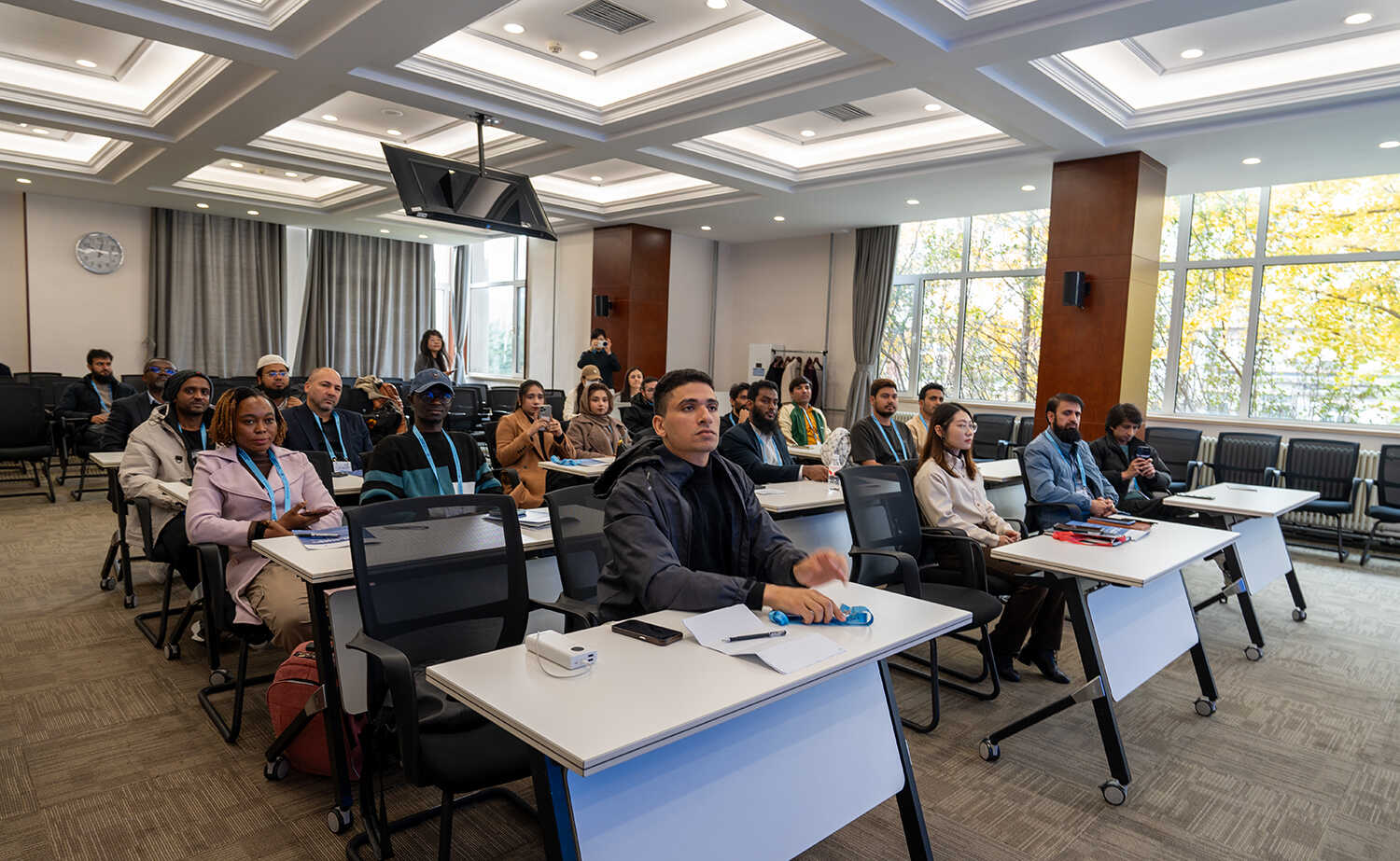 11 18, 2025DICP Holds International Training Workshop on Energy Transition and Technology Applications with the Context of "Dual Carbon" TargetAfter 14 days of lectures, technical visits, and cultural activities, the 2025 International Training Workshop on Energy Transition and Technology Applications with the Context of "Dual Carbon" Target, organized by the Bureau of International Cooperation of the Chinese Academy of Sciences (CAS) and hosted by the Dalian Institute of Chemical Physics (DICP) of CAS, concluded on Nov. 16.After 14 days of lectures, technical visits, and cultural activities, the 2025 International Training Workshop on Energy Transition and Technology Applications with the Context of "Dual Carbon" Target, organized by the Bureau of International Cooperation of the Chinese Academy of Sciences (CAS) and hosted by the Dalian Institute of Chemical Physics (DICP) of CAS, concluded on Nov. 16.The workshop focused on multi-energy integration technologies and industrial developments in hydrogen, energy storage, renewable energy, and chemical engineering, and served as a platform for sharing new ideas with partners from Belt and Road Initiative countries. Through knowledge exchange and discussions, the workshop aimed to support participating countries in jointly addressing climate change and advancing their energy-transition efforts.A total of 25 participants from 10 countries and regions—including Egypt, Ethiopia, Pakistan, Guinea, Rwanda, Bangladesh, Nepal, Tajikistan, Uruguay, and the Central African Republic—took part in the workshop. The group consisted of university faculty members, postdoctoral researchers, graduate students, and industry researchers.The two-week workshop provided a systematic introduction to topics such as clean and efficient development, utilization and coupling substitution of fossil energy, multi-energy complementation and large-scale application of energy, low-carbon and zero-carbon industrial process reengineering, low-carbon and intelligent multi-energy integration. Participants also visited several research and industrial facilities, including DICP's Hydride Energy Chemistry Research Center, Dalian Fude Jinyu New Energy Co., Ltd., and the Dalian Urban Planning Exhibition Center, gaining firsthand insights into China's scientific innovation capabilities and Dalian's achievements as a national pilot zone for high-quality development.The participants expressed strong appreciation for the workshop. A participant from Uruguay said that he would bring the knowledge gained back to his country to help more people understand China's actions and commitments in tackling climate change. A participant from Tajik said that the training provided valuable support for his future research on energy systems and sustainable development. A participant from Nepal said that, given Nepal's heavy reliance on hydropower and its seasonal shortages, the modules on complementary solar–wind technologies offered important insights for building a more resilient national energy system. He also extended an invitation for DICP researchers to visit Pokhara University for further academic exchange.By deepening the understanding of multi-energy integration and the context of "Dual Carbon" target, the workshop helped build scientific capacity among young energy researchers from Belt and Road countries. It is expected to further promote international collaboration in clean energy.
11 18, 2025DICP Holds International Training Workshop on Energy Transition and Technology Applications with the Context of "Dual Carbon" TargetAfter 14 days of lectures, technical visits, and cultural activities, the 2025 International Training Workshop on Energy Transition and Technology Applications with the Context of "Dual Carbon" Target, organized by the Bureau of International Cooperation of the Chinese Academy of Sciences (CAS) and hosted by the Dalian Institute of Chemical Physics (DICP) of CAS, concluded on Nov. 16.After 14 days of lectures, technical visits, and cultural activities, the 2025 International Training Workshop on Energy Transition and Technology Applications with the Context of "Dual Carbon" Target, organized by the Bureau of International Cooperation of the Chinese Academy of Sciences (CAS) and hosted by the Dalian Institute of Chemical Physics (DICP) of CAS, concluded on Nov. 16.The workshop focused on multi-energy integration technologies and industrial developments in hydrogen, energy storage, renewable energy, and chemical engineering, and served as a platform for sharing new ideas with partners from Belt and Road Initiative countries. Through knowledge exchange and discussions, the workshop aimed to support participating countries in jointly addressing climate change and advancing their energy-transition efforts.A total of 25 participants from 10 countries and regions—including Egypt, Ethiopia, Pakistan, Guinea, Rwanda, Bangladesh, Nepal, Tajikistan, Uruguay, and the Central African Republic—took part in the workshop. The group consisted of university faculty members, postdoctoral researchers, graduate students, and industry researchers.The two-week workshop provided a systematic introduction to topics such as clean and efficient development, utilization and coupling substitution of fossil energy, multi-energy complementation and large-scale application of energy, low-carbon and zero-carbon industrial process reengineering, low-carbon and intelligent multi-energy integration. Participants also visited several research and industrial facilities, including DICP's Hydride Energy Chemistry Research Center, Dalian Fude Jinyu New Energy Co., Ltd., and the Dalian Urban Planning Exhibition Center, gaining firsthand insights into China's scientific innovation capabilities and Dalian's achievements as a national pilot zone for high-quality development.The participants expressed strong appreciation for the workshop. A participant from Uruguay said that he would bring the knowledge gained back to his country to help more people understand China's actions and commitments in tackling climate change. A participant from Tajik said that the training provided valuable support for his future research on energy systems and sustainable development. A participant from Nepal said that, given Nepal's heavy reliance on hydropower and its seasonal shortages, the modules on complementary solar–wind technologies offered important insights for building a more resilient national energy system. He also extended an invitation for DICP researchers to visit Pokhara University for further academic exchange.By deepening the understanding of multi-energy integration and the context of "Dual Carbon" target, the workshop helped build scientific capacity among young energy researchers from Belt and Road countries. It is expected to further promote international collaboration in clean energy. -
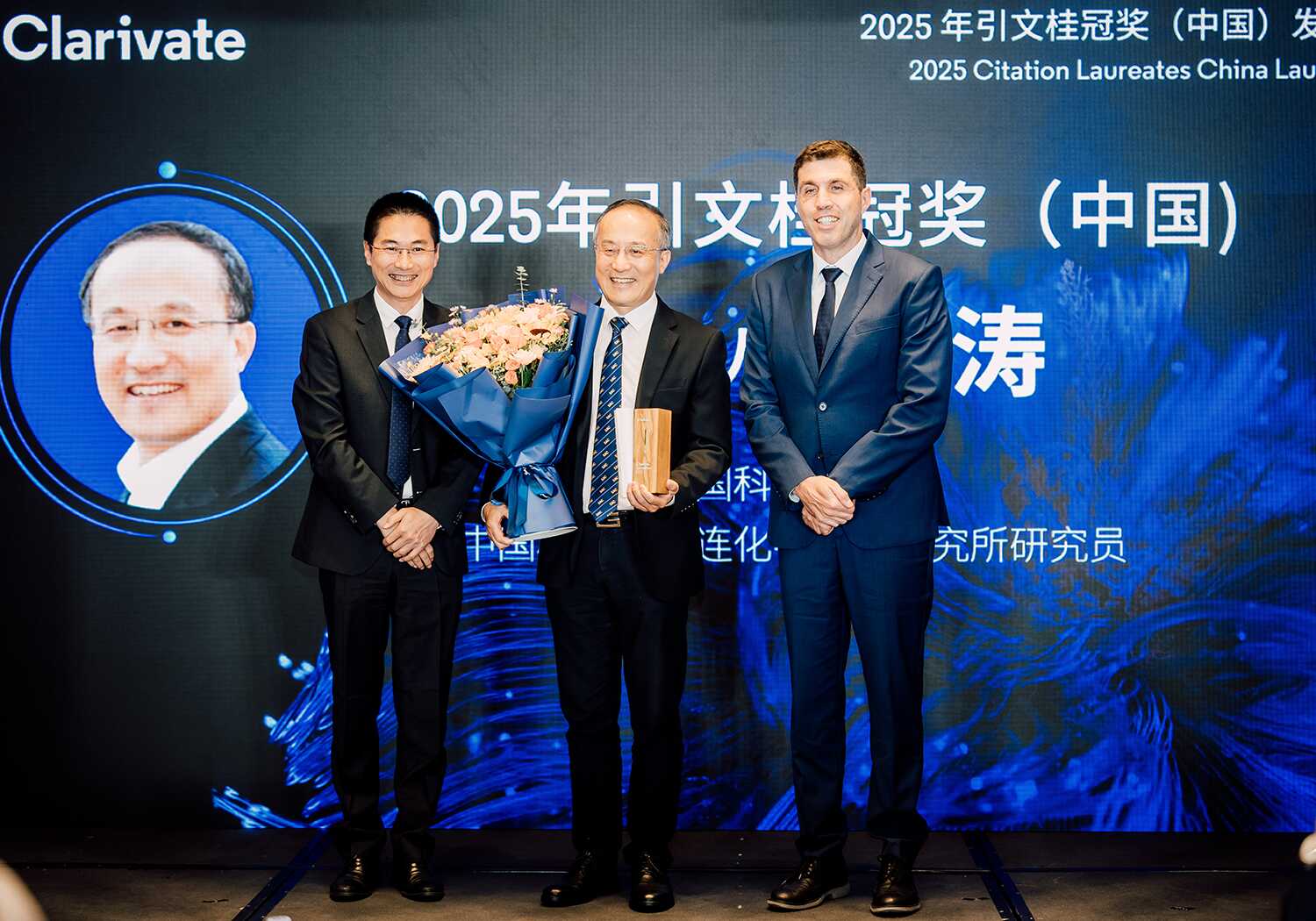 09 25, 2025CAS Academician ZHANG Tao Wins 2025 Citation Laureate AwardZHANG Tao, Academician of the Chinese Academy of Sciences (CAS) and professor at the Dalian Institute of Chemical Physics (DICP) of CAS, was named the Citation Laureates in Chemistry, making history as the first scientist from Chinese Mainlandto receive this recognition.On September 25, Clarivate announced the winners of the 2025 Citation Laureates Award, recognizing a total of 22 distinguished from eight countries. Among them, ZHANG Tao, Academician of the Chinese Academy of Sciences (CAS) and professor at the Dalian Institute of Chemical Physics (DICP) of CAS, was named the Citation Laureates in Chemistry, making history as the first scientist from Chinese Mainlandto receive this recognition.ZHANG was honored for his seminal contributions to single-atom catalysis. He was the first to coin the concept of Single-Atom Catalysis, advancing heterogeneous catalysis research to the atomic scale, laying the scientific foundation for precision catalysis, and opening an entirely new frontier in the field.His groundbreaking research in single-atom catalysis has not only driven fundamental advances in catalysis science but also profoundly influenced several frontier interdisciplinary fields, including energy chemistry and materials science. His research has further stimulated rapid global progress in this area of research.
09 25, 2025CAS Academician ZHANG Tao Wins 2025 Citation Laureate AwardZHANG Tao, Academician of the Chinese Academy of Sciences (CAS) and professor at the Dalian Institute of Chemical Physics (DICP) of CAS, was named the Citation Laureates in Chemistry, making history as the first scientist from Chinese Mainlandto receive this recognition.On September 25, Clarivate announced the winners of the 2025 Citation Laureates Award, recognizing a total of 22 distinguished from eight countries. Among them, ZHANG Tao, Academician of the Chinese Academy of Sciences (CAS) and professor at the Dalian Institute of Chemical Physics (DICP) of CAS, was named the Citation Laureates in Chemistry, making history as the first scientist from Chinese Mainlandto receive this recognition.ZHANG was honored for his seminal contributions to single-atom catalysis. He was the first to coin the concept of Single-Atom Catalysis, advancing heterogeneous catalysis research to the atomic scale, laying the scientific foundation for precision catalysis, and opening an entirely new frontier in the field.His groundbreaking research in single-atom catalysis has not only driven fundamental advances in catalysis science but also profoundly influenced several frontier interdisciplinary fields, including energy chemistry and materials science. His research has further stimulated rapid global progress in this area of research. -
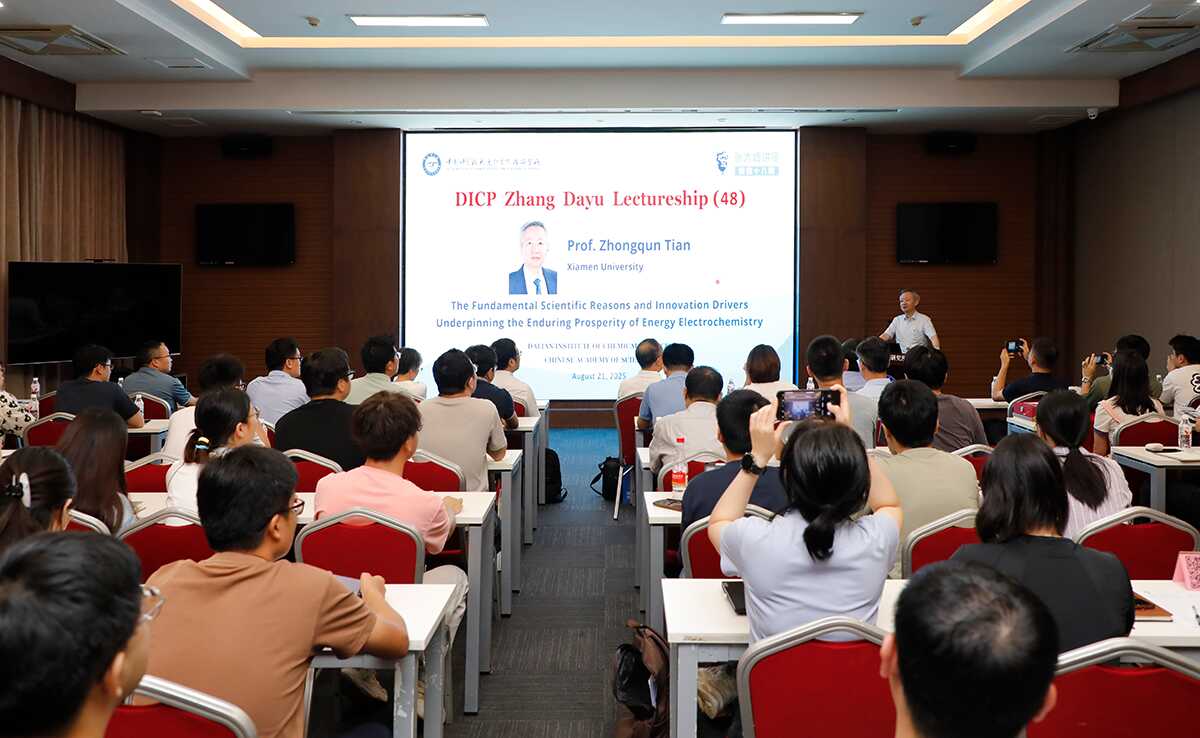 08 25, 2025
08 25, 2025Academician TIAN Zhong-Qun Delivers the 48th Zhang Dayu Lecture at DICP
On August 21, the 48th Zhang Dayu Lecture was delivered by Academician TIAN Zhong-Qun at the Energy Fundamentals Building of DICP.On August 21, the 48th Zhang Dayu Lecture was delivered by Academician TIAN Zhong-Qun, Distinguished Professor at Xiamen University, Member of the Chinese Academy of Sciences (CAS), and Honorary Fellow of the Royal Society of Chemistry, at the Energy Fundamentals Building of the Dalian Institute of Chemical Physics (DICP) of CAS. The lecture, titled "The fundamental scientific reasons and innovation drivers underpinning the enduring prosperity of energy electrochemistry", attracted more than 180 participants on-site and online and was chaired by Academician BAO Xinhe.In his lecture, Prof. TIAN provided a comprehensive overview of the more than 220 years of history and milestone achievements of energy electrochemistry, discussing the fundamental scientific reasons and innovation drivers behind its sustained growth. He summarized the characteristics and development bottlenecks of electrochemical energy devices and emphasized the potential of artificial intelligence and operando characterization methods to boost innovation in fundamental electrochemistry research and accelerate the transformation of the electrochemical energy industry.Prof. TIAN concluded by encouraging young scientists to broaden their research perspectives, elevate their vision, and cultivate innovative thinking. -
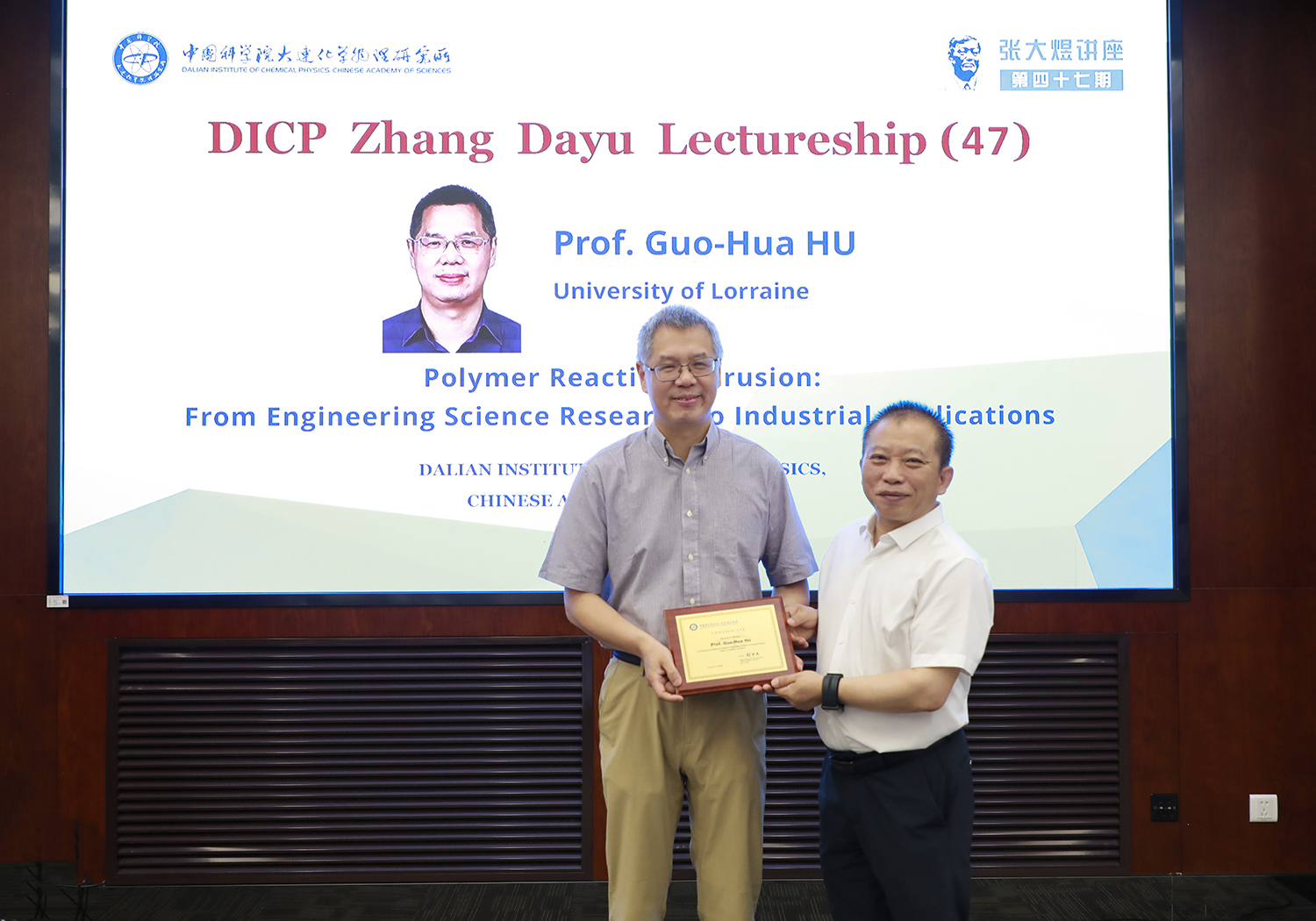 08 01, 2025Academician Guo-Hua Hu delivers the 47th Zhang Dayu LectureThe 47th Zhang Dayu Lecture, entitled "Polymer Reactive Extrusion: From Fundamental Engineering Science to Industrial Deployment," was delivered on 19 July 2025 by Professor Guo-Hua Hu.The 47th Zhang Dayu Lecture, entitled "Polymer Reactive Extrusion: From Fundamental Engineering Science to Industrial Deployment," was delivered on 19 July 2025 by Professor Guo-Hua Hu—Distinguished Professor at the University of Lorraine (Nancy, France), Member of the Academic Institute of France, and Fellow of the European Academy of Sciences—at the Conference Center of the Dalian Institute of Chemical Physics (DICP) of the Chinese Academy of Sciences. The hybrid event attracted more than 180 participants on-site and online, under the chairmanship of Professor YE Mao.Professor LIU Zhongmin, Director of DICP and Academician of the Chinese Academy of Engineering, and Professor LI Xianfeng, Deputy Director of DICP, presided over the opening ceremony. Academician LIU conferred upon Professor Hu both the Zhang Dayu Lecture Certificate and the DICP Honorary Professorship Certificate in recognition of his outstanding contributions to polymer chemical engineering science.In his lecture, Professor Hu provided a comprehensive overview of polymer reactive extrusion, delving into the fundamental functions of co-rotating twin-screw extruders, the mixing mechanisms involved in the fabrication of polymer blends and nanocomposites, the dynamics of composition fluctuation dynamics in multicomponent polymer systems, and the conceptual framework of flow-driven chemistry, along with the scientific and technological challenges. The presentation elicited extensive discussion with attendees on advanced topics in polymer chemical engineering and reactive extrusion processes.
08 01, 2025Academician Guo-Hua Hu delivers the 47th Zhang Dayu LectureThe 47th Zhang Dayu Lecture, entitled "Polymer Reactive Extrusion: From Fundamental Engineering Science to Industrial Deployment," was delivered on 19 July 2025 by Professor Guo-Hua Hu.The 47th Zhang Dayu Lecture, entitled "Polymer Reactive Extrusion: From Fundamental Engineering Science to Industrial Deployment," was delivered on 19 July 2025 by Professor Guo-Hua Hu—Distinguished Professor at the University of Lorraine (Nancy, France), Member of the Academic Institute of France, and Fellow of the European Academy of Sciences—at the Conference Center of the Dalian Institute of Chemical Physics (DICP) of the Chinese Academy of Sciences. The hybrid event attracted more than 180 participants on-site and online, under the chairmanship of Professor YE Mao.Professor LIU Zhongmin, Director of DICP and Academician of the Chinese Academy of Engineering, and Professor LI Xianfeng, Deputy Director of DICP, presided over the opening ceremony. Academician LIU conferred upon Professor Hu both the Zhang Dayu Lecture Certificate and the DICP Honorary Professorship Certificate in recognition of his outstanding contributions to polymer chemical engineering science.In his lecture, Professor Hu provided a comprehensive overview of polymer reactive extrusion, delving into the fundamental functions of co-rotating twin-screw extruders, the mixing mechanisms involved in the fabrication of polymer blends and nanocomposites, the dynamics of composition fluctuation dynamics in multicomponent polymer systems, and the conceptual framework of flow-driven chemistry, along with the scientific and technological challenges. The presentation elicited extensive discussion with attendees on advanced topics in polymer chemical engineering and reactive extrusion processes.